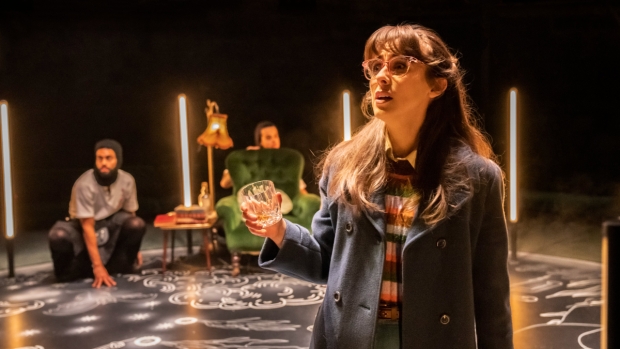The Strange Undoing of Prudencia Hart review – a high-brow patchwork of unevenly stitched genres

© Johan Persson
Writer David Greig and co-creator Wils Wilson wanted to produce a theatre ballad to be told in a pub. You feel like you're arriving at one as you enter to find a pre-show folk session underway, with musicians gathered around a trolley of emptying beer glasses. They then settle into verse to introduce the ballad they'll be sharing of literary scholar Prudencia Hart.
She's a purist for the traditional ballad form. She argues in defence of its beauty; her contemporaries say she's stuck in antiquity. It's a tension between the "mess and ugliness of life" and "the old and pure", suggested by the ensemble's box-thumping or stomping feet, contrasted against gentle, plucking strings. Escape the rigidity of form and she could find "something beyond the words themselves". It's a change of heart she might undergo when she's lured away by the Devil on her journey home, questioning whether the devil really is in the formal detail.
Prundecia's out-of-place awkwardness is shown by Joanne Thomson appearing almost swallowed in bootcut jeans and big glasses, fringe, collar and coat. She conveys her nerdy passion with the forthright manner and forlorn exasperation of a teacher. Her face and pitch seem to rise and come alight in her speeches. She humanises what's essentially a geeky stereotype, but shows little progression or transition through her journey which leaves her final climax underwhelming.
The comedy centres upon the absurdity of her academia—at one moment interrupting the ensemble to footnote her own story—but it often feels like a lecture. Whereas musicals and shows of this style are built out of accessible ideas, Greig's metaphor about poetic form feels high-brow, intellectualising common themes about human fulfilment. It seems a strange programming choice for a Christmas show to be so esoteric, down to jokes requiring familiarity with Pasolini and the Marquis de Sade.
The main delight to relish is Max Johns' design. Miniature plywood buildings form a village scene, creating pockets of light like Greig's pockets of rhyme. Some have smoke creeping out of chimneys or hidden compartments; others become stepping stones or platforms. They sit amidst pillowy mounds of snow, with brushes against Thomson's microphone fortuitously resembling the crunch underfoot. Amy Mae lights the outside setting with wintry blues which also suggest Prudencia's loneliness and the supernaturality of the midwinter witching hour.
The rustic, crafty aesthetic—costumes have floral embroidery and a forest-brown 70s colour palette—complements the folktale storytelling, but it's replaced in the second half by a glossier design. The Underworld features a revolving disk with astrological, mythical illustrations, bordered by LED pillars. Although this loses the appeal of the first half's hand-crafted storytelling, there's subtle mirroring in the way set is slowly taken away. The LED prison bars are removed like the first half's buildings, as the Devil becomes disarmed and defenceless against Prudencia's advances. Red lighting is as multifaceted as the blue, representing hell and love as Prudencia tries to seduce the Devil's heart and escape.
The first half's patchwork quilt carpet is matched by a tapestry of characters. Paul Tinto's Devil is enigmatic with his beguiling, calmly spoken Scottish lilt, hair tufted into two small horns. Oliver Wellington's Colin is humorously bumbling and plucky as her admirer. The cast's unpolished vocals feel atmospheric to the spectral presence of musician Malin Lewis' live accompaniments.
The play itself is a patchwork hybrid of different genres—not all seamlessly stitched together. There are unnecessary ballads like the itemised antics of a hen party, and the second half features gaping sections of Prudencia languishing in hell. But the production's kitsch charm lightens an often impenetrable layer of literary discussion, where there's spirit-warming heart to enjoy beneath.










